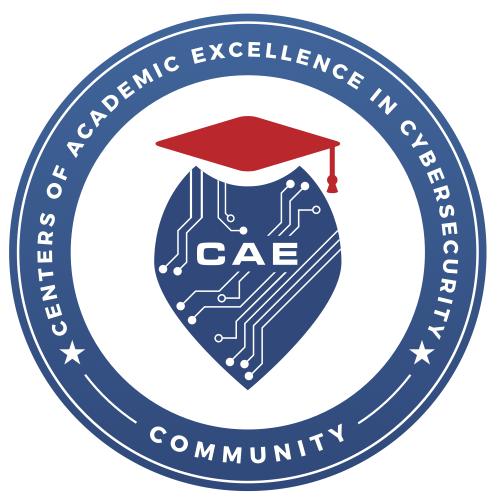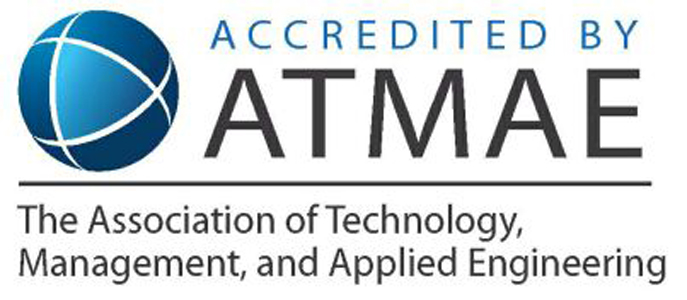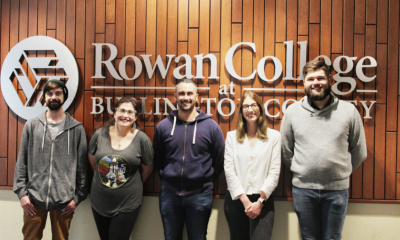
- Academic Calendar
- Complete List of Academic Degree Programs
- 3+1 Program
- The Rowan Connection
- Course Outlines
- Meta Majors
- Online Courses
- STEM Science Labs at RCBC
- Student Research Program
- Global Language Courses at RCBC
- Global Studies, Achievement
- The Baron
Prepare for a career in cyber/information security, computer security, network security, information technology criminal investigation or transfer to a four-year institution. Upon completion of this program, you will be technically competent, able to communicate effectively and demonstrate professionalism.
Program Requirements
(Cybersecurity, AAS.IAC)
|
ATMAE Requirements |
School/Program Degree Requirements Course prefix, number, and title |
Semester Hours |
|
Program/option |
||
|
Communications 6-9 Semester Hours |
ENG 101: College Composition I |
3 |
|
SPE 102: Public Speaking |
3 |
|
|
Total |
6 |
|
|
Mathematics 3-12 Semester Hours |
MTH 130: Precalculus |
4 |
|
Choice: MTH 118: Calculus I and Analytic Geometry (4) or MTH 142: Calculus Techniques and Applications (3) |
||
|
MTH 226: Discrete Mathematics |
3 |
|
|
Total |
7-8 |
|
|
Physical Sciences (Life Sciences may be appropriate for selected programs of study) 3-12 Semester Hours |
Natural Science with Lab |
4 |
|
|
||
|
|
||
|
|
||
|
|
||
|
Total |
4 |
|
|
Management/Technical/Specialization 29-45 Semester Hours |
CIS 138: Introduction to Operating Systems |
4 |
|
CIS 150: Networking Fundamentals |
4 |
|
|
|
||
|
CIS 165: Network and Systems Administration |
4 |
|
|
|
||
|
CIS 200: Fundamentals of Network Security |
4 |
|
|
|
||
|
CIS 207: Introduction to Computer Forensics |
3 |
|
|
Total |
19 | |
|
General Electives 0-12 Semester Hours |
||
|
Total |
60 | |
|
ATMAE Minimum Total 60 Semester Hours |
Degree Total |
60 |
Cybersecurity Degree Sequence of Courses - Print out and use as a guide.
|
Course Number/Name |
Credit |
|
FIRST YEAR First Semester |
15 |
|
ENG 101 College Composition 1 |
3 |
|
MTH 130 Pre Calculus (required) |
4 |
|
Any Sciences |
4 |
|
CIS 138 Introduction to Operating Systems |
4 |
|
Second Semester |
14 |
|
SPE 102 Public Speaking (required) |
3 |
|
CIS 150 Networking Fundamentals |
4 |
|
CIS 165 Networks and Systems Administration |
4 |
|
SOC 160 Society, Ethics and Technology (required) |
3 |
|
SECOND YEAR First Semester |
16 |
|
CIS 200 Fundamentals of Network Security |
4 |
|
CIS 207 Introduction to Computer Forensics |
3 |
|
CIS 215 Penetration Testing Fundamentals |
3 |
|
General Ed Elective MTH 226 Discrete Math (required) |
3 |
|
Arts and Humanities |
3 |
|
|
|
|
Second Semester |
15 |
|
CIS 208 Introduction to Cybersecurity |
3 |
|
CIS 218 Ethical Hacking Fundamentals |
3 |
|
Core Elective CIS 111, or CSE 135* or CIS 139 |
3 |
|
Elective |
3 |
|
Elective |
3 |
Elective: 6 credits Recommend ENG 102*, CIS 161, CSE 110, CSE 151*, CRJ 101, CRJ 207, CRJ 218
* indicates course is required for RU Computing & Informatics
|
Program Learning Outcomes |
|
Upon completion of this program, students should be able to: |
|
1. Analyze a complex computing problem and apply principles of computing and other relevant disciplines to identify solutions |
|
2. Design, implement, and evaluate a computing-based solution to meet a given set of computing requirements in the context of a program’s discipline |
|
3. Communicate effectively in a variety of professional contexts |
|
4. Recognize professional responsibilities and make informed judgments in computing practice based on legal and ethical principles |
|
5. Function effectively as a member or leader of a team engaged in activities appropriate to the program’s discipline |
|
6. Apply security principles and practices to the environment, hardware, software, and human aspects of a system |
|
7. Analyze and evaluate systems with respect to maintaining operations in the presence of risks and threats |
Student Performance and Achievement Information
|
Program |
Fall Enrollments |
|||||
|---|---|---|---|---|---|---|
|
2018FAR |
2019FAR |
2020FAR |
2021FAR |
2022FAR |
2023FAR |
|
|
Computer Science (CSE) |
296 |
262 |
223 |
209 |
258 |
246 |
|
Computer Information Systems (INF) |
59 |
39 |
58 |
52 |
53 |
67 |
|
Cybersecurity (IAC) |
109 |
124 |
99 |
98 |
110 |
134 |
|
Electrical Engineering Technology (EET) |
46 |
51 |
45 |
11 |
7 |
2 |
|
Electrical Engineering Technology (ELT) |
0 |
0 |
0 |
44 |
41 |
39 |
|
Program |
Graduate Rate |
|||||
|
2018 |
2019 |
2020 |
2021 |
2022 |
2023 |
|
|
Computer Science (CSE) |
26% |
28% |
26% |
27% |
29% |
29% |
|
Computer Information Systems (INF) |
32% |
30% |
27% |
28% |
29% |
31% |
|
Cybersecurity (IAC) |
19% |
18% |
10% |
11% |
12% |
16% |
|
Electrical Engineering Technology (EET) |
8% |
7% |
20% |
28% |
50% |
|
|
Electrical Engineering Technology (ELT) |
0 |
0 |
2% |
7% |
5% |
|
|
Program |
Fall to Fall Retention |
|||||
|
2018 |
2019 |
2020 |
2021 |
2022 |
2023 |
|
|
Computer Science (CSE) |
62% |
64% |
57% |
52% |
59% |
60% |
|
Computer Information Systems (INF) |
67% |
65% |
60% |
61% |
65% |
66% |
|
Cybersecurity (IAC) |
67% |
68% |
44% |
45% |
62% |
66% |
|
Electrical Engineering Technology (EET) |
- |
15% |
11% |
12% |
4% |
|
|
Electrical Engineering Technology (ELT) |
17% |
26% |
||||
*The graduation rates are based on a 3-year completion time frame.
*For all RCBC students, the average amount of credits to degree is 75.3.
*For all RCBC full-time students, the average time to degree is 2.3 years.
*For all RCBC part-time students, the average time to degree is 5 years.
Career Placement Information
| Degree | Workforce | Continuing Education | Military | Other |
|---|---|---|---|---|
| Computer Information Systems | 44% | 33% | 11% | 12% |
| Cybersecurity | 11% | 66% | 0% | 23% |
| Computer Science | 11% | 88% | 0% | 1% |
| Electrical Engineering Technology | 50% | 33% | 0% | 12% |
*Continuing education indicates students who transfer to a 4-year institution.
Employer Information by Degree
Computer Information Systems
- TridentCare
- Cooper University Health Care
- Radwell International, Inc.
- Naval Supply Systems Command Weapon Systems Support
Computer Science
- Capital Services
Electrical Engineering Technology
- Lockheed Martin
RCBC Financial Aid Data
At RCBC as a Whole Institution:
- $20,294,000 in Federal Programs
- $3,469,212 in State Programs
- $817,000 in Institutional Programs
- Average Owed by Students after Financial Aid: $2,385.95
Students in the Computer Science, Computer Information System, and Cybersecurity Students and Electrical Engineering Majors on Average Per Year:
- Total Loans Borrowed: $48,102.00
- Total Amount Owed After Loans: $306,067.04
- Total Pell Awarded: $381,604.64
- Total CCOG Awarded: $57,204.00
- Other Aid Awarded: $139, 983.70
Other Scholarships and Grants Available: Academic Excellence Scholarship, Foundation Scholarship, Foundation Scholarship, Military Education Benefits, National Guard Waiver, NJ Best Grant, EOF scholarship, NJ CCOG Grant, NJ CCOG Grant, NJ Stars, NJ TAG Grant, and Other/Outside Scholarship
Tuition Information: https://www.rcbc.edu/tuition
RCBC students taking the Cybersecurity Program who are in good standing can obtain a passing grade if they currently hold an active certification or pass the certification while enrolled in the class. The following courses and the equivalent certifications is below.
|
Course Number |
Course Title |
Equivalent Certification |
# of Credits |
|---|---|---|---|
|
CIS 138 |
Introduction To Operating System |
CompTIA A+ 220-1002 |
4 |
|
CIS 150 |
Network Fundamentals |
CompTIA Network+ |
4 |
|
CIS 200 |
Fundamentals of Network Security |
CompTIA Security+ |
4 |
|
CIS 208 |
Introduction to Cybersecurity |
CompTIA CySA+ |
3 |
|
CIS 215 |
Penetrating Penetration Fund |
CompTIA PenTest+ GIAC Penetration Tester CREST CPTC CPTE |
3 |
|
CIS 218 |
Ethical Hacking Fundamentals |
CEH(Certified Ethical Hacking) Foundstone Ultimate Hacking |
3 |
If you are not a current student at RCBC and is planning to attend RCBC and hold active certifications in any of the areas listed above you will be awarded the appropriate credits with a maximum number of 8 credits.
Meet Shanni R. Prutchi
The Cybersecurity program at Rowan College at Burlington County has had such an immense and positive impact on my education. The program takes a hands-on approach to learning, so in all our classes we get to do what we’re being taught. This practical experience not only improves our understanding of the material, but also prepares us for succeeding in a professional capacity.
Professor Paul Warner, the head of the cybersecurity program, extends our educational opportunities beyond the classroom—inviting recruiters to conduct mock interviews, holding online tutoring sessions, informing us of employment opportunities, making additional resources available to us, and encouraging our growth as students. With the help of this program, I was able to earn a Security+ certification, which I achieved after a semester of one of Professor Warner’s classes and just a few extra hours of studying. The dedication shown by all the professors who contribute to this program is met equally by the dedication and enthusiasm of all of us as students; we put in extra hours to conduct student research, explore the constantly changing cyber-terrain, and are always prepared to take on a challenge.
I will be honest, cybersecurity is not an easy field of study and demands a true passion on behalf of the students, but RCBC’s program fosters that enthusiasm in a manner unparalleled by other colleges.
Shanni Prutchi is a current student at Rowan College at Burlington County, earning her associate of applied science in Information Assurance and Cybersecurity, as well as a bachelor of arts in Computing and Informatics through RCBC’s 3+1 program with Rowan University. She holds a Security+ certification, and on her free time enjoys reading and listening to podcasts.
Over the years I definitely became a person of great strive and a driven force. But it did not start off like that. There was a time where I did not even want to go to RCBC, who would have thought not only was it a plan, but it was also God’s plan for me. [Big man upstairs is always looking out].
Starting out at RCBC, I only wanted to skate by and move on, but I soon learned that RCBC provided SO much in knowledge and hands-on action than previous jobs I have held. Every class and all the assignments started to make more and more sense after I started working in the field. I can’t you tell how many times I would get a new project at work and the first thing I would say was “I did this in class, let me use it as a reference.”
With that snippet in mind, that tells you just how much the program stays up to date as well as keeping it timeless so you can go back and reference the work like I do.
Before graduating with my first Associates in Information Assurance & Cybersecurity, I was able to get accepted for my first technical internship at ASRC Federal Mission Solutions as Information Technology /Infrastructure Product Management Intern. This was a DoD Facility, and they introduce me to every career path I could possibly do. I was able to learn so much just as an intern, and during this time I also decided to complete my second Associates in Computer information Systems before transferring to Rowan University the following semester. This only fortified in my mind how valuable the degrees are, but most importantly the Professors teaching the courses. After completing my year long internship and leaving with so much value such as knowledge, connections, and a SECRET Clearance, I was able to
receive my first Full-Time position before graduating with my Bachelors. I am currently a IT Support Specialist at Evotec (US) inc. (They are a Biotechnology & Pharmaceutical Firm). And during my time here, you would not believe how many classes correspond directly to the job, so I was able to use my golden phrase again “I did this in class, let me use it as a reference”. So, seeing this all-in action only made me more driven and risen my tenacity in learning, which has brought me to where I am today.When I told the news to my Professor via text (Professor Warner), the only thing I was hoping for was text response saying “Congrats” but he did something more meaningfully, he gave me a call almost instantly and we had a great time reminiscing on how I got here, he couldn’t have been more happier
for me.
I was given an offer as a System Engineer in the Cybersecurity Dept. for Gnostech Headquarters (Top Secret DoD Facility). They are very heavily involved in NAVAIR, and I will be working close with Lockheed Martin again, like I did with my previous internship. I will be reporting directly to the Vice President of the Facility. Meaning my Boss's Boss is the President and CEO whom I had to interview with (and successfully did) to receive this opportunity. There I will be utilizing all of my knowledge I was blessed to learn over the years. I cannot wait for the world to see another RCBC student reach great heights.
So as of next month, I will be concluding my Undergraduate with the following Accomplishments along
the way:
2 Associates
Bachelor’s in Computing Informatics, Minor in Computer Science, Concentration in Cybersecurity.
Summa Cum Laude
Member of RCBC’s Cybersecurity Club to President of Rowan University’s Cybersecurity Club
Member of National Society of Black Engineers | Region 1 Chapter
Security + Certification
2 Internships (1 Non-Technical and 1 Technical)
1 Full Time Position
SECRET Clearance (soon to be Top SECRET with my new position)
Finally: Knowledge, Growth, & Leadership
Three Professors I must give a shout-out too are Professor Aloysius Nagbe, Professor Christopher Simber, & amp; Professor Paul Warner. All three Professors gave me direct knowledge, sounds advice, and exquisite techniques every interaction with them. They all watched me learn, grow, & mature into the man I am today. Make sure you utilize their teaching and material to the fullest, it will only benefit you. Thank You Professors!
If you would like you reach out to me on LinkedIn:https://www.linkedin.com/in/timothykoger/
I am always looking to help greater my connection and give any advice I can. Just know you are GOING to succeed too. Also, whether you listen to Gospel or not, I definitely recommend listening to “Better Days” by Kirk Franklin in the good times or bad. The message you will receive will help you see the Light at the end of the Tunnel.
RCBC Computer Science Advisory Board
Understanding the need to meet community and industry expectations for our graduates and recognizing the value of diverse perspectives, Rowan College at Burlington County values the role Program Advisory Boards play in the creation and continual improvement of RCBC’s programs and services. Program Advisory Boards are filled with volunteer employer groups, community organizations, professional associations, students and alumni, and related educational institutions. These groups work collaboratively with the college to encourage innovative approaches to learning in both traditional and nontraditional settings and to ensure that timely and responsive review and assessment keeps RCBC’s programs of study and services relevant and current. These boards serve a critical role in linking the college’s strategic objectives and activities with the interests of external constituents and industry groups.
| Computing Program Advisory Board Members | ||
|---|---|---|
| NAME | AFFILIATION | PROGRAM |
| Colomban, Dean | OTC | Cybersecurity |
| Evans, Tavon-Peterson | Student | Cybersecurity/Computer Information Systems |
| Green, William | RCBC/TNT Rental | Cybersecurity/Computer Information Systems |
| Kamal, Shreeya | Student | Computer Science |
| Hinnant, Wayne | Cybersecurity/Computer Information Systems | |
| Minkiewicz, Arlene | Unison Cost Engineering | Computer Science |
| Moutoux, Joseph | Lockheed Martin | Cybersecurity |
| Parrino, Stephanie | Rowan U | Cybersecurity/Computer Information Systems |
| Plummer, Thomas | Lockheed Martin | Cybersecurity |
| Raphelson, Bruce | Lockheed Martin | Computer Science |
| Rossi, Terry | Pics ITech | Computer Science |
| Spadaro, Stephen | Student | Cybersecurity/Computer Information Systems |
| Togola, Alassane | Alumni | Cybersecurity/Computer Information Systems |
| Temple, Rich | Deborah Heart & Lung Center | Cybersecurity |
| Wittock, Tony | Cybersecurity Consulting Ops | Cybersecurity |
Students graduating from this program must successfully complete a minimum of 12 semester hours of management and/or technical course work at Rowan College at Burlington County.
Paul Warner
Program Coordinator
(856) 222-9311, ext. 2750
pwarner@rcbc.edu


Get ready to talk about cyber threats, become more efficient with Linux, learn to program in languages like python and javascript, pentest and defend networks, and take part in cyber war games.
Want a more in-depth look into your program? Review the college catalog for more details.


